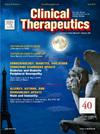青少年肥胖症患者中减肥手术的使用率不足
IF 3.2
4区 医学
Q2 PHARMACOLOGY & PHARMACY
引用次数: 0
摘要
减肥手术是治疗青少年肥胖症患者的一种有效方法,但其利用率仍然很低。我们的目的是深入了解患者对减肥手术的看法,并确定在青春期后早期提高手术利用率的策略。我们研究了一家三级医疗中心 18-22 岁肥胖症患者的电子病历。患者参与了一项与肥胖症治疗相关的跟踪调查。20%的患者在青春期的体重指数≥35 kg/m,而超过一半(54%)的肥胖症患者在18岁以后的体重指数≥35 kg/m,因此有可能符合减肥手术的条件。少数患者(6/280,2%)接受了减肥手术,并在青春期后早期体重大幅下降。其余大多数符合手术条件的患者(141/152,93%)在未进行手术干预的情况下,在刚进入青春期的研究期间体重指数有所上升(0.05-28.6 kg/m)。66.7%的患者在回忆起接受过专门的手术咨询时会考虑将手术作为治疗的一部分,而在没有回忆起接受过咨询的患者中,只有 4.6% 的患者会考虑接受减肥手术。由于在青春期缺乏医疗服务提供者的转介,减肥手术在青春期后早期仍未得到充分利用。医疗服务提供者的咨询是患者是否愿意考虑减肥手术的重要因素。本文章由计算机程序翻译,如有差异,请以英文原文为准。
Bariatric Surgery Underutilization in Young Postadolescent Population With Obesity
Purpose
Bariatric surgery is an established treatment option for adolescent patients struggling with obesity, yet it remains underutilized. We aimed to gain insight into patients’ views of bariatric surgery and identify the strategies for improved utilization of the procedure in early postadolescence.
Methods
The electronic medical records of patients diagnosed with obesity at a tertiary medical center, ages 18–22 years old, were examined. Patients participated in a follow-up survey related to obesity treatment.
Findings
While 20% of patients had BMIs ≥ 35 kg/m2 in adolescence, more than half (54%) of patients with obesity reached BMIs ≥ 35 kg/m2 after 18 y/o, thus potentially qualifying for bariatric surgery. A minority of patients (6/280, 2%) underwent bariatric surgery and experienced substantial weight loss in early postadolescence. Most remaining surgery-eligible patients (141/152, 93%) noted a BMI increase (0.05–28.6 kg/m2) during the immediate young adult study period without surgical intervention. While 66.7% of patients who recall receiving surgery-specific counseling would consider surgery as a part of their treatment, only 4.6% of patients who did not recall counseling would consider undergoing bariatric surgery.
Implications
In the absence of provider referral during adolescence, bariatric surgery remains underutilized in early postadolescence. Provider counseling is an essential component of patients’ willingness to consider bariatric surgery.
求助全文
通过发布文献求助,成功后即可免费获取论文全文。
去求助
来源期刊

Clinical therapeutics
医学-药学
CiteScore
6.00
自引率
3.10%
发文量
154
审稿时长
9 weeks
期刊介绍:
Clinical Therapeutics provides peer-reviewed, rapid publication of recent developments in drug and other therapies as well as in diagnostics, pharmacoeconomics, health policy, treatment outcomes, and innovations in drug and biologics research. In addition Clinical Therapeutics features updates on specific topics collated by expert Topic Editors. Clinical Therapeutics is read by a large international audience of scientists and clinicians in a variety of research, academic, and clinical practice settings. Articles are indexed by all major biomedical abstracting databases.
 求助内容:
求助内容: 应助结果提醒方式:
应助结果提醒方式:


